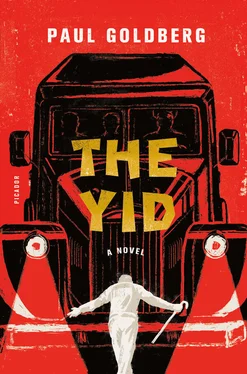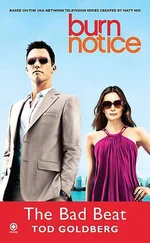He gathers his entire family once, in celebration, buying real vodka for all. Now he considers buying a motorcycle.
Is it wrong for Khromov’s volunteers to dispatch the old man Kuznets and — separately — those two old women, speeding up a few deaths and taking some valuables that would be lost in the pandemonium when it begins?
Alas, Khromov’s volunteers haven’t returned from what appeared to be a simple task — liquidating an old doctor who lives alone.
They haven’t been seen for twenty-four hours, missing their next assignment. They are common thugs who, in exchange for protection, turn over half of everything they loot. Khromov then shares some of the proceeds with Vasyok, his wife’s son from a previous marriage. (They are, after all, his friends.) Have the druzhinniki double-crossed him?
The situation requires Khromov’s personal attention.
* * *
The dacha’s door opens suddenly, letting in a burst of frigid air and nearly blowing out the kerosene lantern.
Shoulder to shoulder, two men squeeze through the door. The older man holds a pistol; the younger, an old berdanka, a rifle of the kind first used by Hiram Berdan’s sharpshooters during the American Civil War, then adopted around the world.
“This is it. Article 58. The wall,” thinks Kogan, recognizing the man with the pistol as Khromov. “Local militia arrests especially dangerous state criminals.”
Levinson looks up at the armed men.
“Dr. Kogan, who are these men? Robbers?” he asks, bringing a glass of tea to his lips.
“How can this lunatic be so completely unperturbed?” Kogan wonders. It looks as though a waiter and a busboy have just appeared to clear the table. This can mean one thing only: der komandir is assuming his battle position. This is his command: remain composed. Nothing is lost until it’s lost.
“At least technically, these men aren’t robbers,” replies Kogan, similarly taking a sip. “One of them is none other than Mikhail Petrovich Khromov, lieutenant of the militia, a man I have always considered to be something of a friend. The other seems to be his wife’s son, Vasyok.”
“Zatkni rylo,” shouts Vasyok, pointing his rifle at Kogan. Shut the snout.
He is very young, his voice still high-pitched.
Disregarding the command, Kogan continues: “I can see how you might have mistaken them for criminals. Militia officers usually knock on your door, introduce themselves, and present you with an official order. Also, it’s extremely unusual for militia officers to deputize members of their own families, arm them with nonstandard weapons, and bring them along.”
This feels good, whatever it is. Kogan slowly accepts the idea that Levinson has a plan.
“So you are puzzled, too?” asks Levinson.
“Quite.” Kogan recognizes the smirk on Levinson’s face.
“Scha blya shlyopnu,” shouts Vasyok, placing the muzzle of his rifle directly against Kogan’s ear. Loosely translated, this means, “I’ll kill you,” but the verb shlyopnut’ , literally, to slap, merits notice: it is, in fact, an affectionate term for an impromptu execution.
Kogan smiles politely.
“Pomolchi,” says Khromov to Vasyok. “Vidish, lyudi intelligentnyye, chay p’yut?” You be quiet. Can’t you see, these are refined people, drinking tea.
“What do you have here? A Jewish holiday?” he asks, moving inside the house, his pistol drawn.
“A feast,” says Levinson.
He recognizes that victory has become possible. Khromov and Vasyok don’t seem to have the wisdom to come in and shoot everyone. This is how Levinson would have conducted an operation of this sort. Instead, these fools have engaged in a conversation, and dialogue brings victory to the person who controls it. At least that’s how it works onstage, how it should be in real life. The process has slowed down. Now the task is to keep them engaged.
“We were just talking about procuring blood, and you walked in,” offers Levinson. “How fortunate!”
Sometimes you have to say something — anything — and stay with it. Keep the enemy stay in conversation and remind the ensemble that “all for one and one for all” is a game with life-and-death consequences. Force them to up the stakes.
“Chto, vpravdu?” asks Vasyok, now pointing his gun at Kogan. So it’s true?
“Zaraneye vam, tovarischi, spasibo,” says Levinson, causing Vasyok to shift his rifle. Thank you in advance, comrades.
“Za chto-zh eto yesche?” asks Khromov. Whatever for?
“Za krov’ vashu svezhen’kuyu, velikorusskuyu. Budet chem zapivat’,” answers Levinson. For your fresh great-Russian blood. I know of no better way to end a meal.
“What’s this about blood? I don’t believe any of this,” says Lieutenant Khromov. “Dr. Kogan and I have known each other for seven years, and I don’t believe that he has ever had a sip of vodka, let alone blood.”
“In that case, what brings you here?” asks Levinson. “Has a child gone missing?”
“Not a child, but we are investigating the disappearance of two individuals whose whereabouts should be known to you,” says Khromov.
“Were they nice people?” asks Ol’ga Fyodorovna.
Her initial fear is gone, too, replaced by infectious defiance. The proximity of gunpowder has chased away the half-nun, giving the half-harlot the dominance she craves. She smiles at the gunmen.
“No,” says Khromov. “I wouldn’t say that they were nice.”
“So would it be a problem if they were gone?” asks Levinson.
“Actually, their disappearance would present certain problems,” says Khromov, the muzzle of his revolver drawing a slow, ponderous circle around the table. “In our country, people don’t disappear.”
“They don’t?” asks Ol’ga Fyodorovna.
“Sasha, my initial suspicion is now confirmed: this is not an official visit,” says Levinson to Kogan. “If it were, by now the good lieutenant would have asked us to show our documents. I believe that we are indeed under attack by robbers.”
“Tak-taki pozovite militsiyu,” suggests Vasyok with a crude imitation of Jewish speech patterns. So call the militia.
“Moisey Semyonovich, we should choose our words carefully,” says Levinson. “An idiot is defined as someone who is likely to discharge his weapon accidentally. Fortunately, they don’t survive long.”
“Let’s get the filiny, ” says Vasyok.
“ Filiny … This is the second time in as many days that someone has demanded my owls,” says Kogan. “I have no owls. You must be talking about tefillin.”
“Yes,” says Khromov. “Must be. Where are they?”
“I don’t believe in God,” says Levinson.
“I am a Marxist,” says Moisey Semyonovich.
“I am a Christian,” says Ol’ga Fyodorovna.
“I am technically a Marxist, very much a scientist, but not completely an atheist,” says Kogan, addressing the barrel of Vasyok’s berdanka . “So my faith and my philosophy — philosophies, really — are often in conflict. It’s a long answer, I realize.”
“Enough. Just hand over the filin ,” blurts Vasyok, nervously swinging his berdanka .
An observer might conclude that Moisey Semyonovich has drifted off into a private dream world, a Bundist paradise, a place without exploitation, where Yiddish is the official tongue of the Jewish working class, and where religion — and therefore Hebrew — is banned; a Stalin frei world where deportations — of Chechens, Crimean Tatars, Lithuanians, or Jews — are unthinkable.
His lips move lightly, like silent trap drums tapping out the symphony that once again blasts in his head. His formidable musculature moves with it, his biceps flex, his fingers extend outward awkwardly, and his groin — the center of athletic prowess — contracts like an inner spring.
Читать дальше












